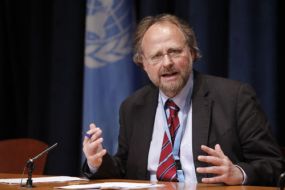Political will to tackle attacks on religious freedom lacking, Vatican aide tells UN rights body

GENEVA - The Vatican has said there is "a lack of political will on the part of the different institutions of the international community" to address attacks on the right of religious freedom.
The comments were made March 9 by Monsignor Richard Gyhra, the interim Chargé d'Affaires of the Holy See mission to the United Nations in Geneva.
He was speaking during a U.N. Human Rights Council discussion on the Report of the Special Rapporteur on freedom of religion or belief.
"Minimizing the essential role that religion has in all societies will not be the answer to the current challenges found in the interplay of [the freedom of religion and the freedom of expression]," said Gyhra.
At the same hearing the UN human rights expert Heiner Bielefeldt noted that any attempt to fight intolerance, stereotyping, stigmatization, discrimination and incite to violence based on religion or belief should make use of both the rights to freedom of religion and freedom of expression.
"There is widespread perception that the rights to freedom of religion or belief and to freedom of opinion and expression are in opposition to each other," the U.N. Special Rapporteur on freedom of religion or belief noted.
He was presenting his latest report to the U.N. Human Rights Council which is in session from Feb. 29 to March 24.
"While freedom of expression seems to signal a 'green light' to all sorts of provocation, freedom of religion or belief seems to give a 'stop sign' instead," he said.
"That kind of misunderstanding typically originates from the view that freedom of religion or belief protects religions or belief systems per se."
In his report, the human rights expert considers that both rights are closely related in law and in practice. "They both also protect unconditionally a person's inner realm of thinking and believing, no restrictions can be justified on whatsoever grounds," he stated.
'OVERCOME IMPUNITY'
One of the recommendation in Bielefeldt's report is that, "States should prevent or overcome a climate of impunity, in which intolerant groups may feel encouraged to commit acts of discrimination, hostility or violence against persons based on their religion or belief."
In his speech Gyhra noted, "We live in a world subject to the 'globalization of the technocratic paradigm,' which consciously aims at a one-dimensional uniformity and seeks to eliminate all differences and traditions in a superficial quest for unity."
He said, "Religions thus have the right and the duty to make clear that it is possible to build a society where 'a healthy pluralism which respects differences and values them as such' is a precious ally in the commitment to defending human dignity... and a path to peace in our troubled world."
Gyhra said that freedom of religion or belief is a fundamental right shaping how humanity interacts, alone or in community and with neighbors who have differing religious views.
"Religious freedom is rooted in respecting the freedom of conscience. By its very nature it transcends places of worship and the private sphere of individuals and families and seeks to build the common good of all persons."
The Vatican diplomat said another essential aspect to the respect for freedom of religion or belief and its relationship with freedom of expression is the limitation that some forms of national legislation impose by not permitting an open exercise of the freedom of religion.
"For a diminution of violations of this essential right, it is imperative that all persons of all religious persuasions, or of no religion, are treated equally as citizens in the fullest sense, without discrimination and persecution because of their convictions or beliefs," Gyhra said.
BLASPHEMY LAWS
At the same session of the Human Rights Council, the British Humanist Association spoke out against blasphemy laws.
BHA representative Cordelia Tucker O'Sullivan condemned the fact that 55 States outlaw blasphemy, 39 imprison people for it and in six it carries the death penalty – and 15 of those nations are members of the Council and cited Russia as one country with such laws.
"In Russia, a law was pssed as recently as 2013 which punishes 'public actions... committed in order to insult the religious feelings of believers' with fines of up to US$15,000, and imprisonment for up to three years.